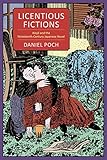Licentious Fictions : Ninjō and the Nineteenth-Century Japanese Novel / Daniel Poch.
Material type: TextPublisher: New York, NY : Columbia University Press, [2019]Copyright date: ©2019Description: 1 online resource : 5 illustrationsContent type:
TextPublisher: New York, NY : Columbia University Press, [2019]Copyright date: ©2019Description: 1 online resource : 5 illustrationsContent type: - 9780231193702
- 9780231550468
- 895.63/3093538 23
- PL747.53.E36
- online - DeGruyter
| Item type | Current library | Call number | URL | Status | Notes | Barcode | |
|---|---|---|---|---|---|---|---|
 eBook
eBook
|
Biblioteca "Angelicum" Pont. Univ. S.Tommaso d'Aquino Nuvola online | online - DeGruyter (Browse shelf(Opens below)) | Online access | Not for loan (Accesso limitato) | Accesso per gli utenti autorizzati / Access for authorized users | (dgr)9780231550468 |
Browsing Biblioteca "Angelicum" Pont. Univ. S.Tommaso d'Aquino shelves, Shelving location: Nuvola online Close shelf browser (Hides shelf browser)

|

|

|

|

|

|

|
||
| online - DeGruyter Subterranean Fanon : An Underground Theory of Radical Change / | online - DeGruyter The Closed Circle : Joining and Leaving the Muslim Brotherhood in the West / | online - DeGruyter Force of Words : The Logic of Terrorist Threats / | online - DeGruyter Licentious Fictions : Ninjō and the Nineteenth-Century Japanese Novel / | online - DeGruyter Manufacturing Decline : How Racism and the Conservative Movement Crush the American Rust Belt / | online - DeGruyter The Ages of Globalization : Geography, Technology, and Institutions / | online - DeGruyter Your Sons Are at Your Service : Tunisia's Missionaries of Jihad / |
Frontmatter -- CONTENTS -- ACKNOWLEDGMENTS -- ABBREVIATIONS -- Introduction -- PART I. Ninjō and the Early- Modern Novel -- Chapter One. From Ninjō to the Ninjōbon: Toward the Licentious Novel -- Chapter Two. Questioning the Idealist Novel: Virtue and Desire in Nansō Satomi hakkenden -- PART II. The Age of Literary Reform -- Chapter Three. Translating Love in the Early- Meiji Novel: Ninjōbon and Yomihon in the Age of Enlightenment -- Chapter Four. Historicizing Literary Reform: Shōsetsu shinzui, Translation, and the Civilizational Politics of Ninjō -- Chapter Five. The Novel’s Failure: Shōyō and the Aporia of Realism and Idealism -- PART III: LATE- MEIJI QUESTIONINGS -- Chapter Six Ninjō and the Late- Meiji Novel: Recontextualizing Sōseki’s Literary Project -- Epilogue -- NOTES -- BIBLIOGRAPHY -- INDEX
restricted access online access with authorization star
http://purl.org/coar/access_right/c_16ec
Nineteenth-century Japanese literary discourse and narrative developed a striking preoccupation with ninjō—literally “human emotion,” but often used in reference to amorous feeling and erotic desire. For many writers and critics, fiction’s capacity to foster both licentiousness and didactic values stood out as a crucial source of ambivalence. Simultaneously capable of inspiring exemplary behavior and a dangerous force transgressing social norms, ninjō became a focal point for debates about the role of the novel and a key motor propelling narrative plots.In Licentious Fictions, Daniel Poch investigates the significance of ninjō in defining the literary modernity of nineteenth-century Japan. He explores how cultural anxieties about the power of literature in mediating emotions and desire shaped Japanese narrative from the late Edo through the Meiji period. Poch argues that the Meiji novel, instead of superseding earlier discourses and narrative practices surrounding ninjō, complicated them by integrating them into new cultural and literary concepts. He offers close readings of a broad array of late Edo- and Meiji-period narrative and critical sources, examining how they shed light on the great intensification of the concern surrounding ninjō. In addition to proposing a new theoretical outlook on emotion, Licentious Fictions challenges the divide between early modern and modern Japanese literary studies by conceptualizing the nineteenth century as a continuous literary-historical space.
Mode of access: Internet via World Wide Web.
In English.
Description based on online resource; title from PDF title page (publisher's Web site, viewed 25. Jun 2024)


